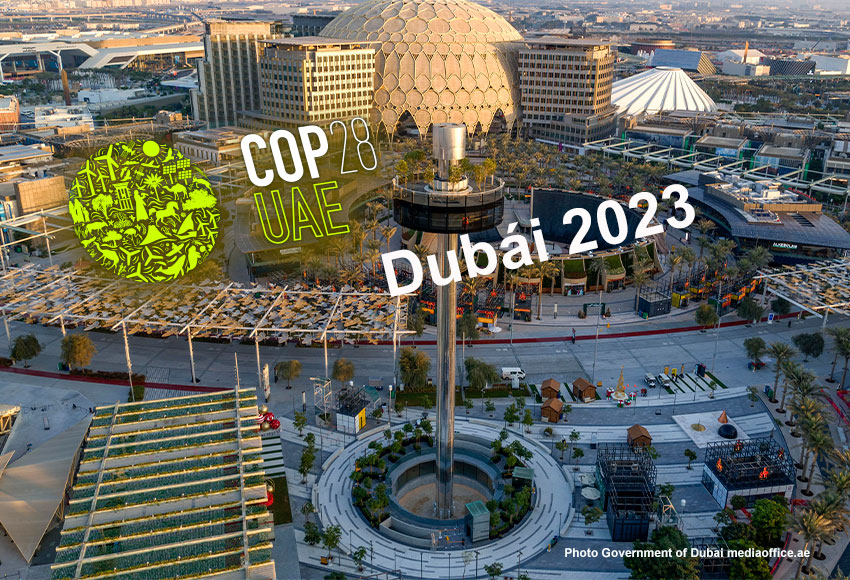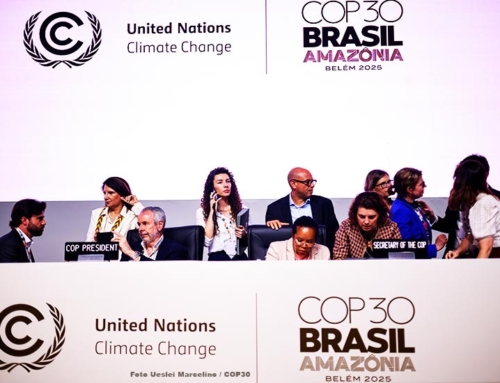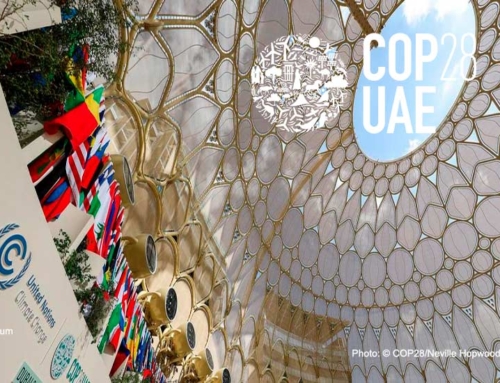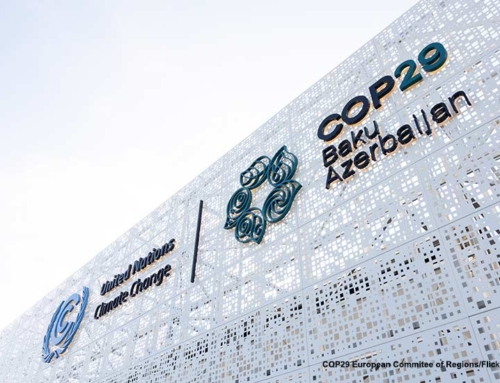Below we present the most relevant data and comments on COP28 to begin on November 30, 2023.
Name of the event: COP28 or 28th Conference of the Parties.
Date: From November 30 to December 12, 2023.
Location: United Arab Emirates, Dubai City, Expo City Dubai Congress Centre.
Motto: “Unite, act, deliver results.”
Central objective: Maintain the increase in global temperature at 1.5°C until 2100.
Specific objectives: Energy transition. Climate financing. Climate adaptation. Loss and Damage Fund.
COP28 Board: President-designate COP28 Dr. Sultan Ahmed Al Jaber, UN Climate Change Executive Secretary Simon Steil, COP28 Director General Majid Al Suwaidi, Youth Climate Champion HE Shamma Al Mazrui, UN Climate Change High-Level Champion HE Razan Al Mubarak.
Estimated participation: 80,000 delegates, a figure that includes 140 heads of state and government and more than 5,000 media professionals.
Agenda and topics to be discussed: See the SGK-PLANET COP28 Information Center.
What we know about COP28
The COPs have been held every year since COP1 in 1995. The COPs were created with the main objective of promoting the fight against climate change and raising climate awareness among the world’s population. But if we look at the numbers, they have not improved, quite the opposite. Now, almost three decades later, the planet is at a point close to no return or difficult to reverse.
We have to say it: its results have more often than not been satisfactory, taking into account that the temperature has broken its record 17 times in this century alone, due to the increase in the greenhouse effect, due to our excessive CO2 emissions. To complete the picture, scientists predict that 2023 will be the hottest year in history.
It is also a true and measurable fact that the PPM, Parts Per Million of CO2 in the atmosphere, was 360 PPM in 1992, the year the COP was created. Since then they have done nothing but go up. The psychological mark of 400 PPM was broken in 2016, and recently in June 2022 it stood at 421. An increase of 17% in just three decades! Figures of 400 PPM had not occurred for three million years. This demonstrates the ineffectiveness of the COPs in achieving their objectives.
The cause of this increase is the amount of fossil fuels that humans have emitted into the atmosphere, especially since the 1950s, the period of the “great acceleration”, followed by the “hyper acceleration” of the 1970s, and continues. growing year after year. If we remember that the objective of the Paris Agreement is to maintain global temperature at 1.5ºC by the end of the century, starting in 1750, and the function of the COPs is to ensure its compliance, it is numerically demonstrated that the Conferences of the Parties do not They have done their job in terms of stopping climate change.
But it’s not just the numbers that are proof of this. At first glance, in our towns and cities we see how climate catastrophes have increased year after year, such as rains, landslides, and landslides. In images we increasingly see overflowing rivers and streams erasing houses and entire towns. The increase in heat and uncontrolled forest fires, which do not respect roads or firebreaks. These large fires are increasingly extensive and difficult to combat and can appear on all five continents. Drought, desertification and the scarcity of drinking water are issues that demonstrate the seriousness of what our planet and its inhabitants are going through, especially due to the inaction of our leaders who are not in charge of following the Paris agreements and the COP climate conferences.
Regarding the financial issue, let us remember that in 2009 developed countries committed to donating one hundred billion dollars a year, until 2020, through the Green Climate Fund mechanism to help developing countries reduce emissions and adapt to change. climate. Regarding the financing of the poorest countries, at COP27 the “loss and damage” format was addressed. A year later, the outlook for how this mechanism will be articulated remains unclear. The United States “has already ruled out paying climate compensation for its polluting emissions throughout history.”
The oil people at COP28
The United Arab Emirates will host COP28. This country is among the ten largest oil producers in the world. Since it was announced that the Emirates would host COP28 in January 2023, the decision was the subject of controversy, especially when it was learned that the president of the summit would be Sultan Dr. Al Jaber, executive director of the state oil company ADNOC. , the world’s seventh largest oil producer.
In his defense, COP28 Director General Majid Al Suwaidi said during an interview with Reuters on the occasion of the Climate Change Conference in Bonn, Germany, on June 6, 2023: “I think he is perfectly positioned within our system. “He understands the process, he knows the actors and he has political contacts.” Al Suwaidi also stated “that having an executive president at the head of the COP for the first time in the history of these summits, and moving away from a purely political process, will help obtain results at the December meeting.”
However, the aforementioned is denied by ADNOC itself, the oil company run by Sultan Al Jaber, reporting that it “plans to expand its production capacity in the coming years.”
To confession of parties relief of evidence
Despite this discouraging news, we believe that there may be a positive turn, since, among other things, we have seen two people, important actors at COP28, issue very harsh, very harsh concepts, like before in no other COP, around the poor results and inefficiency of COP conferences. One of them is Antonio Guterres, Secretary General of the UN, and the other is Simon Stiell, Executive Secretary of the UNFCCC, appointed last year, replacing Patricia Espinosa (2016-2022). Steill has said “The cost of inaction is much greater than that of action.”
Will COP28 be able to make new contributions to advance the fight against climate change?
It is very complex to answer this question, due to the opposite signals that have been presented throughout this year. Let’s see what this is about:
António Guterres has expressed: “Humanity has opened the doors to hell”, a devastating phrase to emphasize the effects that climate change is having after the hottest boreal summer ever recorded, and the succession of tremendous fires in North America and powerful storms in the Mediterranean, which some studies already link to global warming.
“The heat is having horrendous effects”, Guterres recalled. And he further says, “distressed farmers who see their crops wiped out by floods, diseases linked to high temperatures and historic fires. Climate action is dwarfed by the magnitude of the challenge.” As the head of the UN has warned, he has turned his attention against companies that try to block the fight against climate change with his money and influence.
The New Synthesis Report and the Global Review
UN Climate Change has published a new synthesis report designed to help governments make decisions on the global stocktake of the Paris Agreement at COP28. The report reflects the views of governments and their perspectives on the main elements that could constitute such a decision.
The global stocktake is part of the Paris Agreement and is a key means of assessing the global response to the climate crisis and charting a better path forward.
The synthesis report is comprehensive and includes the views of almost all Parties. It is based on Nationally Determined Contributions (NDC), which represent the commitments assumed by countries to reduce greenhouse gas (GHG) emissions and adapt to climate change. Views were received from 24 Parties on behalf of groups of Parties or individual Parties, representing 180 Parties, and from 44 non-Party stakeholders (as of 2 October 2023).
Simon Stiell, Executive Secretary of UN Climate Change, was clear when expressing:
This report puts the cards on the table – except this is not a game. “We know that we, as a global community, are not on track to achieve the long-term goals of the Paris Agreement and that there is a rapidly closing window of opportunity to secure a liveable and sustainable future.
The synthesis report, Stiell added, “is a preliminary draft of what could be the final result of the global balance sheet, based on the Parties’ own words. “Nations should make full use of the input to build consensus around an ambitious outcome towards action in this critical decade.”
Sultan Al Jaber, President-designate of COP28, stated:
“The report once again tells us that the world is going in the wrong direction. COP28 is the time for all Parties to come together and put viable solutions on the table. We must be prepared with real responses to meet the challenges, eradicate 22 gigatonnes of emissions by 2030, strengthen global resilience and mobilize finance at the scale necessary to enable a just and equitable transition. “Now is the time to come together, act and deliver a strong negotiated outcome on global inventory.”
Both the statements of the Executive Secretary of UN Climate Change and the president of COP28 were published in the statement “The implementation of climate action must be accelerated on all fronts: Synthesis report of the first global assessment” of UN Climate Change on 10 September 2023.
If all these issues are aired at COP28, we predict that this conference will be the crudest and most controversial among all those that have been held, but perhaps it will be the one that provides the most tangible results.
Sandor Alejandro Gerendas-Kiss
SGK-PLANET Editor







Leave A Comment